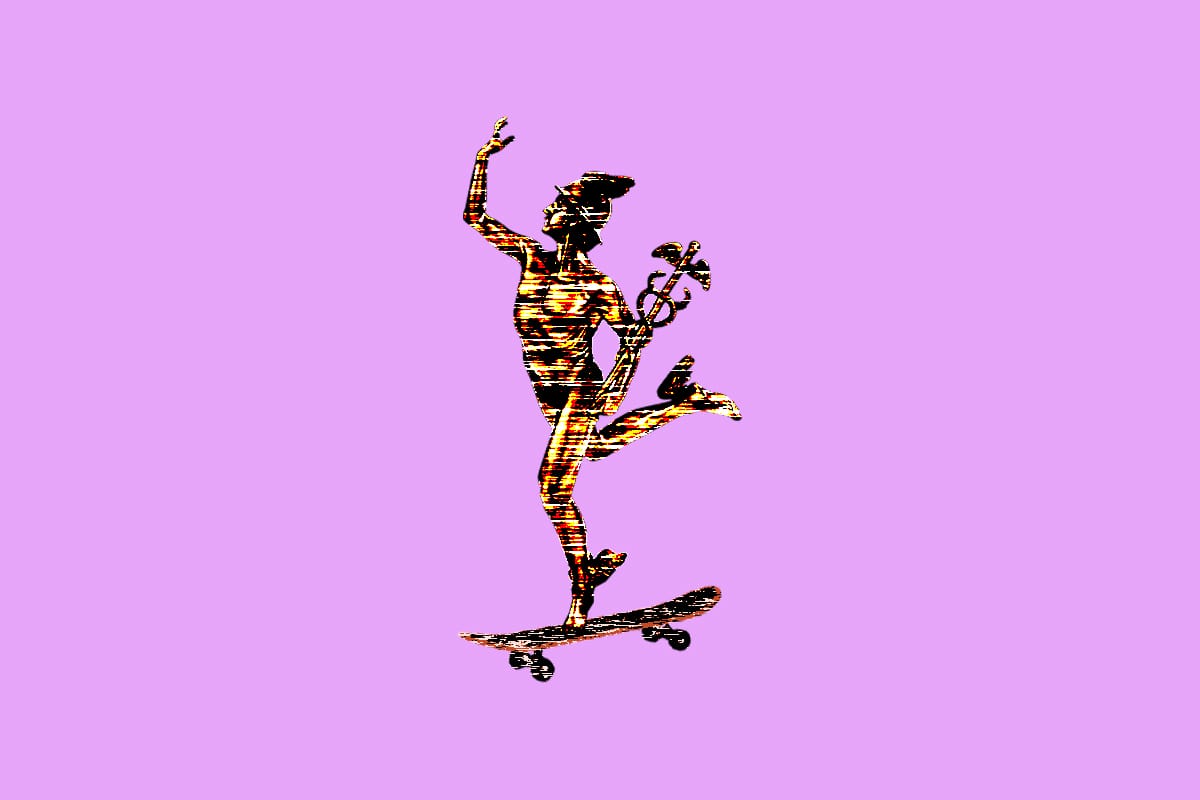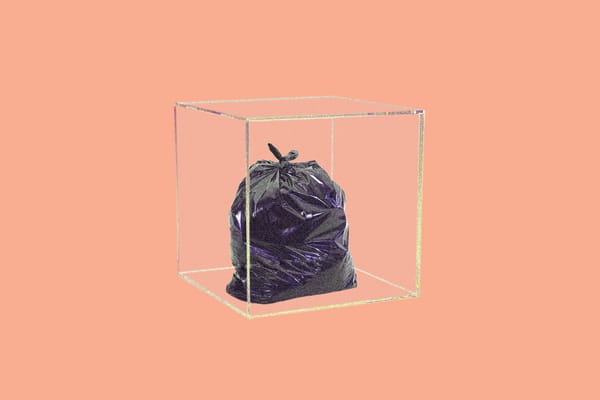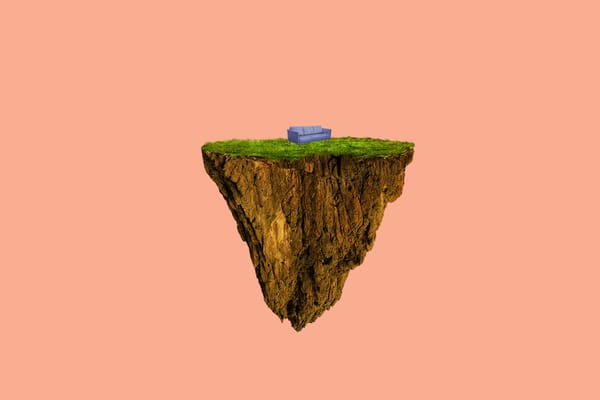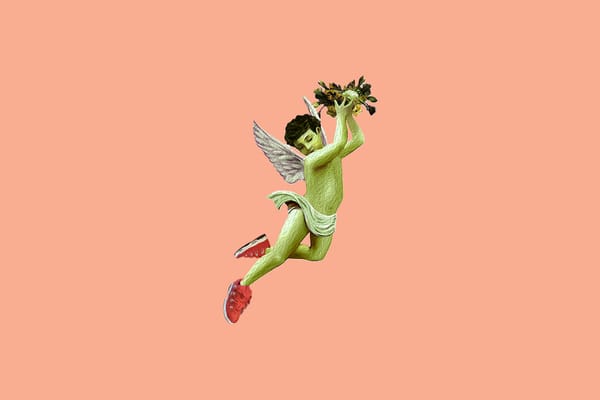Mythologizing Failure
On lessons real and imagined.

Everything you see before you is built on the bones of imperfect ideas. Formica chairs, 2% milk, your iPhone 8 with the cracked screen. These are all things that ostensibly work but at one point didn’t, or not well enough. They were sketches, prototypes, or dangerously unpasteurized. Only through trial and error did they arrive where they have today — and did we arrive where we have. Holding these things in the midst of our own successes and failures.
It’s those failures that we often pay the most attention to. They become burrowing gnats of regret, fetid woulda-coulda-shouldas, or inspiration for an awe-inspiring glow-up. All of which are overly romanticized instances of simply not doing a thing. And, as things go in a world stuck in the yoke of capital, our stumbles are also wounds to be poked, prodded, and exploited. Entire industries have been created in response to our past or potential failures. Insurance providers provide coverage until it becomes inconvenient for their coffers. Self-styled self-help gurus promise solutions to everything from a tepid love life to an empty bank account.
That’s when failure becomes a cudgel, and success a naturally occurring result of either enduring its blows or outsmarting it, thanks to this one neat trick that usually requires forking over a fistful of money.
In skateboarding, failure could accurately describe most of a person’s time spent riding one. Attempting, falling, trying, eating shit. That’s the bedrock of the act. The necessary suffering on the way to the momentary salvation of riding away. This is not unique to skateboarding, of course, but there aren’t many more literal examples of getting knocked down and getting back up again being seen as progression than what advancing in skill as a skateboarder or Chumbawumba lyrics requires.
Failure is so central to skateboarding culture that “slam sections” were once a staple of the videos produced to glorify the act. That bruising, twisting, and scraping are the sketches and prototypes of a trick yet realized. An imperfect idea until it isn’t. Until you’re riding away, perfect.
This everyday brutality tends to harden the practitioner. It introduces pain, sacrifice, patience, and an expectation of all three to one’s physical vocabulary. The level of danger involved at skateboarding’s highest level is proof to some of a higher purpose or designation. Hellride. Hall of Meat. Damage incurred is a license. Scars the card to show all who care.
The skateboarder's self-administered agony is often interpreted as mettle. Determination. The thing that led erstwhile comedian Jerry Seinfeld to declare that skateboarders “will be alright” — because falling, getting back up, and succeeding teaches you something. It does, I’m sure. But I think we've started to lose sight of what.
At a TEDxSFU (Simon Fraser University) event held in November 2023 and uploaded to the TEDx Talks YouTube channel in March 2024, professional skateboarder Micky Papa speaks for roughly 17 minutes on the idea of “Mastering Failure.” Papa is a longtime PRO for Blind Skateboards, a former Olympian for Team Canada who competed at the Tokyo 2020 Games, and someone who probably doesn’t get the recognition they deserve for their sheer technical ability.
However, Papa doesn’t want us to focus on his accolades. He wants to ask us a question.
“Failure. What comes to mind? A memory? Of failure? A visceral feeling in your gut? Go to that space. Your mind serves you a cocktail of inadequacy and rejection. With the lingering aftertaste of uneasiness. Where do you go from here? How do you cope with it? Reliving all the moments that brought you here, now, in this space — skateboarding. This is the day-in, day-out process of your average skateboarder.”
Papa speaks with the slow, mechanical ease of someone with remedial media training. His face forms around his words, brow furrowing at his own questions, corners of his mouth curling upwards to indicate where a joke might be. He asks the audience by a show of hands, who has skateboarded before. Hands shoot up. He asks who is still skateboarding, and it’s presumably a steep drop off given how far his eyebrows climb his forehead.
“You know what I hear all the time? ‘I fell a lot. I wasn’t very good. I figured it just wasn’t for me’ — that’s the whole point. None of us are very good.”
He goes on to say that skateboarding is 80% failure and invokes the universal lie of “one more try” to explain the delirious hold skateboarding can have on a person in search of that elusive 20%, all of which more or less feels right. But then Papa attempts to quote Albert Einstein, shoehorning in a famous misattribution to the renowned physicist that is both wrong and doesn't support the point he's trying to make.
“The definition of insanity is doing the same thing over and over again and expecting different results.”
Most of what comes afterwards is literally the stuff of LinkedIn influencer pablum. Buzzwords and self-help gobbledygook that you’ll find worded just slightly differently if you copy and paste it into your search bar.
“We celebrate failure, like a visit from an old friend… most people can’t live in that space… that’s because most people play not to lose. Think about that.”
“Redefining your relationship to failure can unmask the hidden potential in every stumble, misstep and moment of doubt. Turning that same adversity into an advantage and setbacks into comebacks.
“Failure is a superpower that any ambitious person should seek to harness. And as skateboarders, we get so familiar with the constant failure, rejection, getting kicked out, getting told we don’t belong here, that we live in this space. This is right where we belong. In fact, I’ve been kicked out of SFU [for] skateboarding so many times, yet here we are at TEDxSFU.” 1
Papa’s commitment to skateboarding, eventual successes, and subsequent notoriety more than likely helped him land a spot on the TEDx stage. But drawing a line from the inherent failures one endures and overcomes in skateboarding to that stage is strange, given that his determined careerism brought him there, not shaking off a shinner at the skatepark. One generally has to apply to be a part of TEDx. It’s more a signifier of status than a place to share an original thought. The whole TED ecosystem has long since moved beyond “ideas worth sharing” to a multi-million dollar business and brand-expanding licensing venture.
When the flagship TED event returned to Vancouver in 2022 (with noted bigot and charlatan Elon Musk as a co-headliner), it took a Freedom of Information request to learn about the hundreds of thousands of dollars the organization paid in venue fees, per Business in Vancouver, which was likely small potatoes given how much TED raked in, according to BIV:
“The US$5,000 to US$25,000 conference passes are all sold out, according to the TED website. Organizers offer a US$250,000, five-year “patron” package, which includes a concierge, opportunities to meet speakers and a tax receipt for US$235,000. For those who want the talks without the travel, there is a US$500 pass to watch the livestream online this week or US$150 to watch on-demand afterward.”
While independently run series like TEDxSFU are significantly cheaper to attend (Papa’s would range from $15-$95), SFU has just borrowed a brand name as a platform for the same bland moralizing and vaguely inspiring nothings. These events are merely a shiny log item for the speaker’s LinkedIn profile.
Papa’s core story of “mastering failure” doesn’t even track with the topic at hand. He tells the audience that as a kid growing up in a single-family household, his mother didn’t have the money to buy him a ticket to Slam City Jam, so he engaged his “skatebrain” to devise a plan: asking his classmates for their pocket change. It was a success. Once at Slam City Jam, he didn’t have enough money to purchase a blank deck that was on sale, but his skatebrain kicked in and he... convinced his friend to lend him $5 bucks to cover the difference and even got a free sheet of grip after a bit of whinging. While skating that new deck at the skatepark the next day, a talent scout approached him about a commercial opportunity (presumably because he was skating so well on the fresh board) but had to once more use his skatebrain to... trick his mother into letting him audition. He’d eventually get the part, earn a few thousand dollars, and help his mother pay her bills.
It's a touching anecdote, but what does it have to do with “mastering failure?” Is failure not having money? What Papa presents on stage is not an intelligible moral or message but his desire for the mirage of success the stage offers, illustrated by the brazen meaninglessness of his final statement:
“I don’t know much, but I do know this: we’re going to go on the path of our lives from here, and we’re going to strive to build the tallest towers of achievement, and we’re going to hit the lowest lows at sometimes. But on that path, there will be a fork in that road, and on one side, there will be a convenience stop. It will feel comfortable, and there will be a sign that says, ‘This is just as far as your vehicle can go, and it’s not your fault, so just relax and take a load off.’
“On the other, there will be a dark and scary road with failure waiting for you amongst all the potholes and roadblocks that will deter you from your goal. Should you choose to see and accept it as that old friend it really is, it will have a fresh supply of imagination, choice, and, ultimately, freedom. So I urge you, take the path underdeveloped. You have no idea where you’re going to end up — skateboarding at the Olympics, giving this talk, to a whole new challenge ahead. Where do you go from here? How do you cope with it? Reliving all the moments that brought you here, now, in this space?”
To be fair to Papa, this has become the path of our lives. Dull platitudes in place of progress. Empty lessons in nothing but brand building. I’m sure he means well, but meaning has been flattened here. Einstein becomes a caricature to be misquoted. Plus, what else can you say that Rodney Mullen didn’t a decade ago?
So what does failure teach us then? Whatever insights you manage to pull from the wreckage. Maybe the chair should be more ergonomic or the milk heated up to remove tuberculosis-causing bacteria. What do we learn from falling off our skateboards? At best, to keep on falling. To fail better. Is that a valuable life skill? Absolutely. But you can become hardnosed without breaking it. You can have guts, guile, and a steely resolve without mythologizing where they come from.
One overlooked thing skateboarding teaches a person is that it’s okay to want to be better than you were yesterday, to inch your way into a new self or to grow within yourself, that we are not static but possibility incarnate. Ultimately, the skateboard doesn’t care what lesson we take away; all it wants is for us to ride it.
1 A bit nit-picky, but TEDxSFU actually took place at the Centre for The Performing Arts in Vancouver, not Simon Fraser University.





